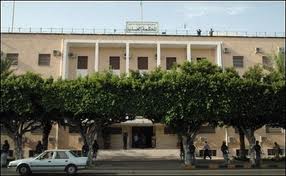By Lorianne Updike Toler.

London, 13 March 2103:
The Supreme Court ruling at the end of last month invalidating Amendment No. 3 of . . .[restrict]the Constitutional Declaration has again cast some doubt on whether the Constitutional Commission will be elected or appointed. Yet the situation may give rise to an opportunity to fix the ails of the Constitutional Declaration.
When asked how the GNC is likely to respond to the decision, Congressman Abdulmonem Alyaser, one of Libya’s leading decentralisation specialists and an independent member from Khoms, said, “No one knows now, we will have to wait and see what the opinion of the general public is”.
Although the Constitutional Declaration tasked the General National Congress (GNC) with appointing the Constitutional Commission, Amendment No. 3, passed 5 July 2012, two days before scheduled elections, removed that power and instead gave the choice to the people.
The amendment was challenged in court because it was not passed by a 2/3 majority vote of the entire body of the NTC as required by the Declaration. After waiting for the Supreme Court to issue an opinion, the GNC responded to perceived public opinion in voting on 5 February to comply with the amendment.
Prior to Tuesday’s decision, GNC spokesman Omar Hemidan predicted, “If the Supreme Court invalidates Amendment Three, it would also invalidate the GNC’s vote to comply.”
The GNC is now in exactly that position, leaving it to either properly pass a constitutional amendment with the requisite 132 votes, or proceed to appointment.
Yet although the legal requirement to host elections has now been removed, public opinion still trends towards election.
Concurrent to the GNC’s 5 February vote, the Benghazi University’s Research Centre had been commissioned by the GNC to host a country-wide survey on election versus selection. According to the survey, 48 percent of Libyans preferred elections and another 30 percent preferred a mixture of appointment and election.
There is some doubt, however, that those surveyed understood the options. Although a clear majority favored some form of elections, 71 percent also wanted groups such as experts, women, religious scholars and youth to be represented on the Constitutional Commission – the kind of representation one normally sees on an appointed constitution-writing body. According to experts, such a representation of various groups is virtually impossible to contrive within an electoral system.
Despite public confusion regarding the realities of elections, the clear preference for some kind of election remains. If this proves determinative, the GNC will be required to pass a valid constitutional amendment.
Indeed, Congressman Alyaser confirmed this as the likely direction of the GNC. “The GNC did not yet get a chance to discuss the Supreme Court’s decision,” he said, “but it seems that there is some inclination to go ahead with making the [5 July] Constitutional Amendment valid and to move ahead with the election of the Commission of 60 as planned.”
The passage of a new constitutional amendment is the perfect opportunity for the GNC to take a leadership role in ending the delays and guesswork regarding the country’s constitutional roadmap.
As outlined in the last article in this mini-series on constitutional design, the feared unrest prior to 15 February and now the confusion introduced by the Supreme Court’s decision Tuesday can all be attributed to the poor constitutional design of the Constitutional Declaration and particularly of Amendment No. 3. Not only is the timeline for authoring a constitution too short, there is no provision for adequate public participation, transparency, or inclusiveness – the cardinal hallmarks of contemporary constitutional success.
If the GNC decides to comply with public opinion in continuing to pursue elections, they will also have an opportunity to amend the failings of the Constitutional Declaration and carve out an appropriate leadership role for themselves vis-à-vis the constitution. Doing so should be done in close coordination with experts both local and international (canvassed here) and with civil society organisations (CSOs) playing an active role in constitutional matters (canvassed here) who can support and enforce the process.
Albania’s constitutional design benefited from a dedicated intergovernmental body coordinating the recommendations of both the international community and local CSOs. Although it need not be official, such a body could facilitate trust between key leadership. It could enable the GNC to benefit from the best advice available from comparative perspectives and Libyan expertise and opinion, coupled with the honest feedback of those with large constituencies focused on constitutional issues, such as the network of 500+ CSOs who have signed on to the “manifesto” calling for participation, transparency, and inclusiveness in the constitutional process. More, a coordinating body could draft a constitutional process that accords with the best advice, public opinion, and the needs and realities of shepherding a successful constitutional amendment through the GNC.
In terms of substance, Libya’s constitutional roadmap should outline several key points, including key principles of constitutional design, a timeline or identification of mandatory phases (to be addressed in the next article in this mini-series), and the manner of elections or combined election and selection.
Once consensus is reached on these points, the GNC should pass a constitutional amendment to ensure implementation of the roadmap. There are four main reasons a constitutional amendment should be the vehicle by which a roadmap is instituted:
1. Allowing the GNC power to manage procedure would limit their substantive constitutional involvement.
Although many are leery of any constitutional role for the GNC, it is important to remember that constitutional language, including those in interim constitutions such as the Constitutional Declaration, can limit even while it grants power. Many members of the GNC are eager to play a role in the Constitution – it is one reason many of them ran, in that they believed they would play a significant part by selecting the Constitutional Commission. Granting them a significant role but limiting it to the enforcement of the constitutional roadmap laid out in the amendment would prevent them from assuming a substantive role.
2. Establishing a roadmap via constitutional amendment designed by major elements in society is consistent with best constitutional practice.
In comparative perspective, outlining a constitutional process or roadmap is a hallmark of interim constitutions. Roadmaps that have been successful in transferring power in a democratic and legitimated fashion are found in the interim constitutions of South Africa (1994) and Poland (1992).
In South Africa, the interim constitution outlining principles, requirements, democracy and later, public participation, was negotiated behind closed doors between representatives of major forces within the country – the African National Congress and the National Party – essentially, the organisations representing the largest divide within the country. It was amended 10 times.
In Poland, a 1992 amendment to the Communist Constitution, dubbed the “small constitution” outlined a procedure for adopting the new constitution and again was a negotiated instrument between major elements within the country—the two largest parties. In addition to outlining a constitutional roadmap, this document fixed the problems of the old constitution by clarifying the relationship between the executive and legislative bodies and requiring at least half of the assembly to be in attendance in order to make important amendments.
Key to success of both of these interim constitutions is that they were decided by major elements of society that also represented a large majority of that society. Admittedly, neither group creating the interim document was inclusive of all elements. Yet both were “democratic” in that they represented, either by vote (Poland) or by the overwhelming size of their constituencies or legacy power (South Africa), the viewpoints of most of the country’s polity. This as opposed to interim constitutions designed largely by parties from previous regimes (South Sudan, 2005; Thailand, 2006). In Libya, including voices from major constituencies within the country, the GNC, government, international and local experts and civil society leadership – via a coordinating council to design a roadmap – will track the design processes of the two most successful interim constitutions, that of Poland of South Africa.
3. A roadmap contained within a constitutional amendment is legally enforceable.
Enshrining a roadmap for Libya’s constitutional process within a constitutional amendment is the only way to make a roadmap legally enforceable. It is the method by which processes may be enforced legally by the highest authority of the land – something that a coordinating body, no matter how inclusive, would not be able to do itself.
4. Dividing power will protect Libyans’ liberties.
By dividing power – procedural constitutional power to the GNC and substantive constitutional power to the Constitutional Commission – Libyans can be assured that neither body will overstep its bounds. This is the benefit and security of true checks and balances that separated power provides. For most countries with true separation of powers (found to a greater extent in presidential rather than parliamentary systems), the power of coeval branches helps to ensure that no one branch oversteps its bounds. The same kind of benefit and system could be taken advantage of in Libya for the limited time that both the GNC and Constitutional Commission are in simultaneous operation.
Danielle Tomson contributed to this report.
This is the fourteenth editorial in a series on constitutionalism authored by constitutional legal historian Lorianne Updike Toler, founding president of The Constitutional Sources Project and Lorianne Updike Toler Consulting. [/restrict]











